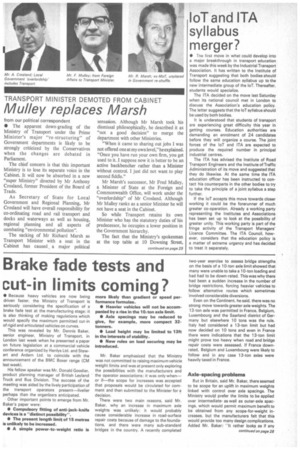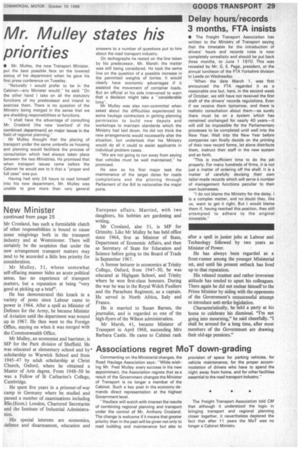TRANSPORT MINISTER DEMOTED FROM CABINET
Page 27

Page 31

If you've noticed an error in this article please click here to report it so we can fix it.
Mu/ley replaces Marsh
from our political correspondent • The apparent down-grading of the Ministry of Transport under the Prime Minister's major "re-structuring" of Government departments is likely to be strongly criticized by the Conservatives when the changes are debated in Parliament.
The chief concern is that this important Ministry is to lose its separate voice in the Cabinet. It will now be absorbed in a new "super Ministry" directed by Mr Anthony Crosland, former President of the Board of Trade.
As Secretary of State for Local Government and Regional Planning, Mr Crosland will have overall responsibility for co-ordinating road and rail transport and docks and waterways as well as housing, regional planning and all aspects of combating "environmental pollution-.
The sacking of Mr Richard Marsh as Transport Minister with a seat in the Cabinet has caused, a major political sensation. Although Mr Marsh took his dismissal philosophically, he described it as "not a good decision" to merge the department with other Ministries.
"When it came to sharing out jobs I was not offered one at my own level," he explained. "Once you have run your own firm, you get used to it. I suppose now it is better to be an active backbencher rather than a Minister without control. I just did not want to play second fiddle."
Mr Marsh's successor, Mr Fred Mulley, a Minister of State at the Foreign and Commonwealth Office, will work under the "overlordship" of Mr Crosland. Although Mr Mulley ranks as a senior Minister he will not have a seat in the Cabinet.
So while Transport retains its own Minister who has the statutory duties of his predecessor, he occupies a lower position in the Government hierarchy.
The fact that the Ministry's spokesman at the top table at 10 Downing Street, Mr Crosland, has such a formidable clutch of other responsibilities is bound to cause some misgivings both in the transport industry and at Westminster, There will certainly be the suspicion that under the new arrangement transport matters may tend to be accorded a little less priority for consideration.
Mr Mulley, 51, whose somewhat self-effacing manner hides an acute political sense, has no experience of transport matters, but a reputation at being "very good at picking up a brief".
He has demonstrated this knack in a variety of posts since Labour came to power in 1964. After a spell as Minister of Defence for the Army, he became Minister of Aviation until the department was wound up in 1967. He then went to the Foreign Office, staying on when it was merged with the Commonwealth Office.
Mr Mulley, an economist and barrister, is MP for the Park division of Sheffield. He was educated at elementary school and by • scholarship to Warwick School and from 1945-47 by adult scholarship at Christ Church, Oxford, where he obtained a Master of Arts degree. From 1948-50 he was a Fellow of St Catharine's College, Cambridge.
He spent five years in a prisoner-of-war camp in Germany where he. studied and passed a number of examinations including BSc.(Econ.) London, Chartered Secretaries and the Institute of Industrial Administration.
His special interests are economics, defence and disarmament, education and European affairs. Married, with two daughters, his hobbies are gardening and writing.
Mr Crosland, also 51, is MP for Grimsby. Like Mr Mulley he has held office since 1964, first as Minister of State, Department of Economic Affairs, and then as Secretary of State for Education and Science before going to the Board of Trade in September 1967.
A former lecturer in economics at Trinity College, Oxford, from 1947-50, he was educated at Highgate School, and Trinity where he won first-class honours. During the war he was in the Royal Welch Fusiliers and the Parachute Regiment, as a captain. He served in North Africa, Italy and France.
He is married to Susan Barnes, the journalist, and is regarded as one of the high-flyers of the Wilson administration.
Mr Marsh, 41, became Minister of Transport in April 1968, succeeding Mrs Barbara Castle. He came to Cabinet rank after a spell in junior jobs at Labour and Technology followed by two years as Minister of Power.
He has always been regarded as a front-runner among the younger Ministerial set, and until his present setback has lived up to that reputation.
His relaxed manner and rather irreverent attitude has tended to upset his colleagues. There again he did not endear himself to the Prime Minister by siding with the opponents of the Government's unsuccessful attempt to introduce anti-strike legislation.
Characteristically, he held a party at his home to celebrate his dismissal. "I'm not going into mourning," he said cheerfully. "I shall be around for a long time, after most members of the Government are drawing their old-age pensions."
























































































































